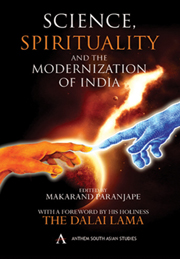Book contents
- Frontmatter
- Contents
- Notes on Contributors
- Foreword
- Editor's Preface
- I Science and Spirituality: East and West
- II Coming to Terms with Science: Some Change Agents
- CHAPTER 3 Sir Sayyid Ahmed Khan and the Modernization of South Asian Muslims
- CHAPTER 4 Acharya Jagadish Chandra Bose: Looking beyond the Idiom
- CHAPTER 5 Sri Aurobindo and Krishnachandra Bhattacharya on Science and Spirituality
- CHAPTER 6 Chaos, Complexity and Emergence Mechanisms: Spiritual Evolution in Sri Aurobindo and Teilhard de Chardin
- CHAPTER 7 Science, Spirituality and Swaraj: Towards a New Aesthetics of Ethical Existence
- III Building Bridges: Evolution, Consciousness and Healing
- IV Science and Spirituality: Culture, Society and Gender
CHAPTER 3 - Sir Sayyid Ahmed Khan and the Modernization of South Asian Muslims
from II - Coming to Terms with Science: Some Change Agents
Published online by Cambridge University Press: 05 March 2012
- Frontmatter
- Contents
- Notes on Contributors
- Foreword
- Editor's Preface
- I Science and Spirituality: East and West
- II Coming to Terms with Science: Some Change Agents
- CHAPTER 3 Sir Sayyid Ahmed Khan and the Modernization of South Asian Muslims
- CHAPTER 4 Acharya Jagadish Chandra Bose: Looking beyond the Idiom
- CHAPTER 5 Sri Aurobindo and Krishnachandra Bhattacharya on Science and Spirituality
- CHAPTER 6 Chaos, Complexity and Emergence Mechanisms: Spiritual Evolution in Sri Aurobindo and Teilhard de Chardin
- CHAPTER 7 Science, Spirituality and Swaraj: Towards a New Aesthetics of Ethical Existence
- III Building Bridges: Evolution, Consciousness and Healing
- IV Science and Spirituality: Culture, Society and Gender
Summary
The greater world around Muslims had become a closed book. What is more they had no wish to open the book and read. They had long ceased to follow the Prophet's injunction to ‘seek knowledge even as far as China’. Islam was afflicted with intellectual rigor mortis. The French religious writer Ernest Renan spoke of an ‘iron circle’ enclosing the head of the faithful in the Orient and Africa, making them impervious to fresh ideas and incapable of accepting anything new.
(Walker, p.346)He may not have succeeded in reinterpreting and implementing the core tenets of Islam as per the needs of the compulsive circumstances; however it is indubitable that Sir Sayyid's life and writings have been subjected to contending interpretations. For both Muslims as well as non-Muslims, he is the repository of a difficult heritage. There are not few in the subcontinent for whom he remains the progenitor of Partition; for many more he nurtured the irrevocable Bidad (a reprehensible religious innovation) and thus sprinkled salt on the wounds of South Asian Muslims who had not yet recovered from the agony engendered by the dispossession of power and privilege. The extinction of the Muslim rule had caused great pain and anguish 48 Science and Spirituality and with Sir Sayyid's radical intervention challenging long cherished values and belief systems in the religious sphere, the pain was further accentuated.
- Type
- Chapter
- Information
- Science, Spirituality and the Modernisation of India , pp. 47 - 64Publisher: Anthem PressPrint publication year: 2009



